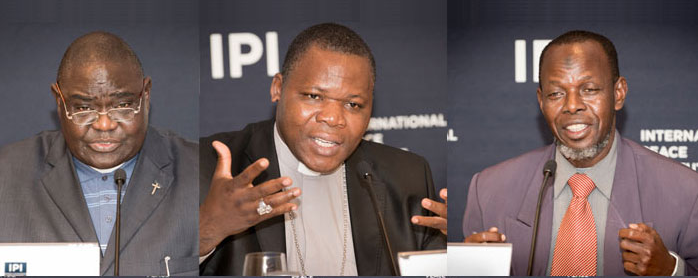
“This is not a religious crisis, actually,” said Dieudonné Nzapalainga, Catholic Archbishop of Bangui, Central African Republic (CAR) on March 14th. “It is a political and military crisis.” The archbishop joined two other faith leaders at the International Peace Institute to discuss opportunities to stop the killing that broke out in December 2012.
Some politicians used propaganda and mercenaries to instigate a sectarian conflict and crack open faith-based fault lines in CAR, argued the Reverend Nicolas Guérékoyamé Gbangou, President of the Evangelical Alliance of the Central African Republic. After politicians spread rumors that Seleka fighters planned to “destroy the country,” a wave of reprisal violence against Muslims swept the capital, he explained.
Anti-balaka—which means anti-machete—is the term given to Christian, village-defense militias, originally formed in the 1990s. After violence broke out at the end of 2012, then-President François Bozizé called for anti-balaka fighters to rise up, and they’ve been killing Muslims ever since, the reverend explained. These militias—comprised largely of unemployed youth and ex-convicts—have been “going village to village” and recently entered Bangui “like a swarm of locusts,” he added.
Archbishop Nzapalainga condemned corrupt elites who would employ religion and violence for personal gains. “Some politicians want to walk over human blood to reach their goals,” he said.
Crisis of Impunity
The word Seleka in French means coalition, explained Imam Omar Kobine Layama, President of the Central African Islamic Community. In other words, Seleka is not one entity but a number of different groups, he said.
Despite demilitarization efforts of the government several years ago, some groups kept their arms, creating an explosive political situation, the Imam said. He contended that poor governance of that past disarmament plan was the “main root cause” of the current crisis.
In light of the “political degradation of this country,” the Seleka coalition’s only clear aim was to “overthrow the government,” he explained.
However, Imam Kobine also noted that decades of war and abuses with little to zero legal recourse underlies the violence and consequent revenge killing that have spread across the country. A history of impunity “contributed gravely” to the current conflict, he said. “The crisis is also a crisis of impunity,” he added.
New Platform for a Ghost Country
The religious leaders are building momentum for initiatives to create interfaith schools and hospitals, noted Archbishop Nzapalainga. “All together, we should enjoy health care,” he said.
By focusing on education, health care, and young people, they hope to alleviate faith-based tensions and help build an inclusive society for the next generation of Central Africans, explained the Catholic leader. Through these projects, they hope to see a “pedagogical message, a structure where doctors and teachers, where everybody is mixed together,” he said.
However, the archbishop warned that although initiatives of this kind are needed for long-term reconciliation, they will falter unless the immediate conflict is stabilized. Today, “it’s a ghost country in terms of the state,” he said.
Reverend Gbangou agreed with his catholic counterpart. He said that without a functioning army or government policy agenda to speak of, “we are afraid for our safety.”
The panelists urged the immediate deployment of a United Nations peacekeeping mission to restore security in CAR. Without this intervention, they argued, the conflict will likely escalate to a civil war that could threaten the entire region.
If “designers of these plans” manage to unify Seleka forces in the north, Reverend Gbangou said in closing, “it’s going to bring a fratricidal war. It’s going to bring genocide in our country.”
Watch event:







